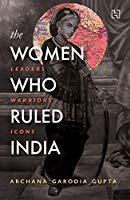The Women Who Ruled India: Leaders. Warriors. Icons.

Price: [price_with_discount]
(as of [price_update_date] - Details)

[ad_1]
‘People say that I am a quarrelsome woman...’
TARABAI, MARATHA QUEEN (1675–1761)
The history of India, more often than not, is a history of the men who were in charge. Largely forgotten are the women who, even centuries earlier, shaped the fates of entire kingdoms.
In The Women Who Ruled India, writer and researcher Archana Garodia Gupta revives 20 such powerful figures from the archives, offering us a glimpse of their fascinating lives. Among them are Begum Samru, a courtesan who went on to become the head of a mercenary army and the ruler of Sardhana; Didda of Kashmir, known for her keen political instinct and a ruthlessness that spared no one; Rani Abbakka of Ullal, the fearless queen who took on Portuguese colonizers in their heyday; and Rani Mangammal of Madurai, the famed administrator who built alliances at a time when going to war was the order of the day.
These women and others like them built roads, instituted laws and were generous patrons of the arts and sciences. Their stories of valour and diplomacy, leadership and wit continue to inspire today. Peppered with anecdotes that showcase little-known facets of their personalities, the accounts in this book celebrate heroic rulers who – ‘quarrelsome’ though they might have been – were iconoclasts: unafraid to forge new paths.
From the Publisher
Read about twenty feisty and inspiring, yet largely forgotten, women in Indian history who shaped the fates of entire kingdoms:
The Bhaumakara Queens - defying the norms of a patriarchal world, six Mahadevi queens of the Bhaumakara dynasty successfully ruled Odisha in the 9th and 10th centuries.
Didda of Kashmir - known for her keen political instinct and a ruthlessness that spared no one.
Raziya Sultan - the first Muslim woman ruler and the only woman to rule as the Sultan of Delhi.
Rudrama Devi of Warangal - “She was a lover of justice, of equity, and of peace, she was more beloved by those of her kingdom than ever was a Lady or Lord of theirs before.” - Marco Polo.
The Heroines of Chittor - Tarabai, Karmavati, Jawahirbai and Mirabai, the unusual Chittor royal women, who were warriors, administrators, rulers and poets.
Rani Durgavati ruled Gondwana with great ability for 20 years and died on the battlefield defending her kingdom from Mughal armies.
Abbakka of Ullal - the fearless queen who burnt a Portuguese fleet and took on the colonizers in their heyday.
Chand Bibi - ruled the fractious kingdoms of Bijapur and Ahmadnagar as regent for many years and defended Ahmednagar successfully from Akbar’s forces.
Nur Jahan - the all-powerful queen of the Mughal Empire who ruled for 15 years and set lasting precedents in the fields of fashion, jewellery, cuisine, entertainment, literature, architecture, gardening and interior design.
Karnavati of Garhwal decisively defeated an invading army dispatched by Shah Jahan to capture her kingdom, and sent them back with their noses chopped off!
Rani Mangammal of Madurai - a famed administrator who built alliances at a time when going to war was the order of the day.
Chennamma of Keladi - best remembered for her quixotic act of sheltering the fugitive Maratha king Rajaram, and then holding off the armies of Mughal Emperor Aurangzeb.
The Attingal Ranis - the mothers of the kings of Travancore, who also ruled their own territory of Attingal independently for 400 years.
Tarabai - saved the Maratha Empire from Aurangzeb, and over time spread the power of the Marathas into Mughal territory.
Ahilya Bai Holkar - Her rule of 30 years of the state of Indore was extraordinary and is considered one of the best reigns in the country, by man or woman.
Veeramangai Velu Nachiyar - a much-feted Tamil heroine, she is hailed as the first woman freedom fighter against the British in the 1770s, predating Kittur Chennamma and the Rani of Jhansi.
Begum Samru - a courtesan who went on to become the head of a mercenary army and the ruler of the prosperous kingdom of Sardhana, Meerut, for 55 years.
Kittur Chennamma - one of the earliest to battle the British, valuing her freedom above all else.
Lakshmibai of Jhansi - “The Ranee was remarkable for her bravery, cleverness and perseverance; her generosity to her subordinates was unbounded. These qualities, combined with her rank, rendered her the most dangerous of the rebel leaders.” - General Sir Hugh Rose.
The Begums of Bhopal - Bhopal was ruled by four women rulers in succession for more than a century, whose enlightened and inclusive rule saw efforts to better the lives of the people, creating an early prototype of a welfare state.
[ad_2]
Comments
Post a Comment